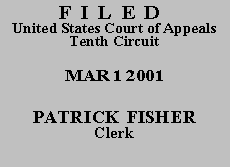

| STEVEN LYNN BALES,
Plaintiff-Appellant, v. DALE UPTERGROVE, Marshall County Undersheriff, in his official capacity; LINDA VOLES, Jail Official, Marshall County Jail, Defendants-Appellees. |
|
Bales' principal contentions in this appeal are that the jury's verdict in favor of the defendants was against the weight of the evidence and that the nominal damages award was so inadequate as to require a new trial. Unfortunately, Bales failed to preserve these alleged errors by raising them before the district court.
Appellate courts review only those claims of legal error on which the trial court has first had an opportunity to rule. See, e.g., Neu v. Grant, 548 F.2d 281, 287 (10th Cir. 1977). There are two routes available to present a claim that a verdict was against the weight of the evidence to the district court. First, a party may file a motion for judgment as a matter of law (JMOL) at the close of all the evidence, see Fed. R. Civ. P. 50(a), followed by a renewed motion for judgment after trial, see Fed. R. Civ. P. 50(b). Second, he may file a motion for new trial after the jury has returned its verdict against him. See Fed. R. Civ. P. 59.(1) Bales did not follow either route in this case.
Failure to move for a new trial, or to file a Rule 50(b) motion on the ground that the verdict was against the weight of the evidence, waives the issue for purposes of appeal. See Scarfo v. Cabletron Sys., Inc., 54 F.3d 931, 948 (1st Cir. 1995). Failure to file a motion for new trial also waives any argument concerning the adequacy of the damages the jury awarded. Cf. Morrison Knudsen Corp. v. Fireman's Fund Ins. Co., 175 F.3d 1221, 1256 n.45 (10th Cir. 1999) (stating, in context of compromise verdict, that grounds for new trial arising in context of post-trial proceedings must be presented by means of a motion for new trial); see also Mason v. Okla. Tpk. Auth., 115 F.3d 1442, 1457 (10th Cir. 1997) (stating that court of appeals reviews district court's determination that damages are not so inadequate to require new trial).(2) For this reason, we cannot review Bales' claims concerning the weight of the evidence and the sufficiency of the damages awarded.
Bales also argues that the district court erred in sustaining an objection by defense counsel during his attorney's closing argument. One of the issues in this case was whether the defendants violated Bales' Eighth Amendment rights by leaving him shackled for an extended period of time. During closing argument, Bales' counsel stated that the law required medical permission before a prisoner is restrained for an extended period. Defendants' counsel objected that there was no such law. The district court sustained the objection.
Bales' trial counsel did not cite any law in response to defendant's objection, and on appeal, no such law is identified. It is the province of the district court to instruct the jury concerning the law applicable to a case, not that of the litigants' attorneys. Fed. R. Civ. P. 51. The jury instructions in this case contained no reference to the alleged law identified by counsel. Appellant's trial counsel had ample opportunity to request such an instruction if he wished to have the jury instructed concerning the existence of such a law. Bales has failed to show that the district court made any error of law or that he is otherwise entitled to a new trial because the district court sustained defendants' objection.
The judgment is AFFIRMED.(3)
Entered for the Court
Circuit Judge
*. After examining the briefs and appellate record, this panel has determined unanimously that oral argument would not materially assist the determination of this appeal. See Fed. R. App. P. 34(a)(2); 10th Cir. R. 34.1(G). The case is therefore ordered submitted without oral argument.
This order and judgment is not binding precedent, except under the doctrines of law of the case, res judicata, and collateral estoppel. The Court generally disfavors the citation of orders and judgments; nevertheless, an order and judgment may be cited under the terms and conditions of 10th Cir. R. 36.3.
1. Early cases from this Court suggested that a party could bring a Rule 59 motion for new trial even if the party had not previously filed a motion for JMOL prior to submission to the jury. See, e.g., Ketchum v. Nall, 425 F.2d 242, 243 (10th Cir. 1970) (entertaining motion for new trial based on claim that verdict was contrary to evidence, despite absence of motion for directed verdict). More recent cases seem to undermine that proposition. See FDIC v. Schuchmann, 235 F.3d 1217, 1231 (10th Cir. 2000) (barring claim that verdict was against weight of evidence, in absence of proof party filed a Rule 50(a) motion, even though insufficiency of evidence was raised in party's motion for new trial). We need not decide which rule applies here because Bales filed neither a Rule 50 motion nor a Rule 59 motion for new trial.
2. Perhaps recognizing the import of his procedural default, Bales complains that his attorneys were ineffective in failing to pursue adequate post-trial remedies. Ineffective assistance of counsel does not relieve a litigant from an adverse judgment in a civil case. MacCuish v. United States, 844 F.2d 733, 735 (10th Cir. 1988). Bales' appropriate remedy for any allegedly incompetent representation in this case is a malpractice suit against his trial counsel. Id. at 735-36.
3. In light of the district court's transmission of the record on appeal to this Court, appellant's "Motion for Appeal to be Heard on the Full Record" is denied as moot.